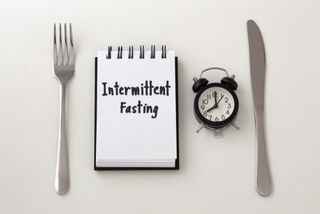Diet
What You Should Know About Intermittent Fasting
New research explains what works and doesn't work about time-restricted eating.
Posted February 22, 2021 Reviewed by Ekua Hagan

"Diet is the most important thing you can do for your health." —David L. Katz, M.D.
David Katz is the Founding Director of the Yale-Griffin Prevention Research Center and an expert on health and nutrition. First, notice that Katz didn't say "going on a diet" is the most important thing you can do for your health. He also didn't say "dieting to lose weight" is the most important thing you can do for your health. In this case, "diet" means literally "what you eat."
But which "diet" is best for your health?
We know that certain ways of eating have been linked over and over to health issues. This was confirmed in a recent article on the Global Burden of Disease study. It was reported that: Inadequate intake of fruits and vegetables, beans and lentils, whole grains, and excessive intake of processed meat and processed food overall was the leading cause of chronic disease and early death in modern countries around the world.
It's a fact that there is no one diet that works for everybody.
Despite the research that proves this fact, many people continue to look for a "perfect diet" (diet to go on) and cycle from one fad diet to the next, hoping that they will find a quick fix or a solution to their food and body image issues. But the truth is there is no one diet that fits all people. Such is the case with a current fad: the intermittent fasting diet.
Intermittent fasting (IF) diet: IF has been popular as an alternative to counting calories and also as an anti-aging approach and possible therapy for cancer, neurologic disease, and heart disease. But most of these health claims and proposed explanations for how IF works have been based on animal studies and have not been tested in humans. Also, there are many claims on social media that have no evidence to support them whatsoever. The most popular form of IF is "time-restricted feeding," which involves restricting daily intake to certain hours of the day.
Multiple studies have shown that IF is not better than calorie restriction (other diets) in improving health markers and that the benefits of IF are due to restricting calories, not due to metabolic effects of fasting. People on IF tend to eat 300 to 500 calories less per day when they restrict themselves to an eight-hour window.
Here is the latest research on the IF diet and my interpretation of what each study means:
1. In a study of 250 individuals with BMI >27 who chose between the IF, Mediterranean (Med), and Paleo diets, at the 12-month mark, only a little over half of the Med and IF participants and only one-third of the Paleo participants were still following their chosen diet. Weight loss at 12 months was 8.8 lbs (IF), 6 lbs (Med), and 4 lbs. (Paleo). There was a reduction in blood pressure with IF and Med and a reduction in blood sugar in Paleo—but not significant. Of note is that there was a high dropout rate even though participants picked their own diet, and the changes in blood pressure and blood sugar were not significant (Jospe, et al. 2020).
Interpretation: This again verifies how difficult it is to stay on any restricted eating diet for very long and is one of the many reasons why diets don't work
2. In a review of studies on the IF diet, it was concluded that the results did not show evidence that IF had an effect on weight loss (Lima, et al. 2020).
Interpretation: Researchers continue to put their eggs in the one basket of equating weight loss to health despite how this biases their studies. This shouldn’t be the main thing we are studying; what about other well-known markers of health (blood sugar, blood pressure, physical fitness, etc.)?
3. In a study comparing consistent meal timing (CMT) (eating three structured meals per day) with time-restricted eating (TRE) (eating what you want from 12 p.m. to 8 p.m. and no calories from 8 p.m. until 12 p.m. the next day), it was concluded after 12 weeks that TRE was no more effective in weight loss than eating throughout the day (Lowe, et al. 2020).
Interpretation: I again question the focus on weight loss as a marker of success or as equaling good health. As well, this study, like many studies on diets, looks at a very short period of time. As most dieters know, it's easy to do something for 3 months, much harder to change behaviors for longer.
4. A review by Kim et al., 2020, concluded that “there is no single best strategy for weight management. Hence strategies for weight loss and its maintenance should be individualized, and healthcare providers must choose the best strategy based on patient preferences."
Interpretation: See #1 above, where patients did choose a preferred diet, but where there was a high drop, and 50-60 percent were not on their preferred diet by 1 year. This conclusion also instructs doctors (who should be experts in nutrition but are not and are the #2 purveyors of weight stigma) to listen to patients. This is a setup that enables the diet industry to continue to blame patients for "failing" to stay on a diet or failing to have "results" (usually measured by the number on the scale) from a diet.
5. An in-depth article by Halpern and Thiago (2021) showed:
- While IF diets are generally safe and well-tolerated, they are not better at helping you burn calories or keeping you from feeling hungry.
- There are conflicting results on whether IF improves insulin resistance, anti-aging, or anti-inflammatory benefits (most studies were in animals).
- People with eating disorders were excluded from research, so we can't confirm that IF leads to binging or triggers eating disorders. However, other studies have shown that restricting is often associated with binging.
Interpretation: Many issues were addressed, but it is frustrating that researchers continue to ask the wrong question.
If you as a researcher have the belief that being in a larger body or having a BMI above 27 is inherently bad and unhealthy, then the only solution is to change your size/the number on the scale, which is what researchers continue to do, despite evidence that this is a biased approach.
Some questions that have never been asked:
- Is there a way of eating that individuals can stay on for longer than 3 months? Is this eating plan easy, simple, and does it cause feelings of deprivation that often lead to binging?
- Is there an eating plan that would be healthy for the whole family, not something that only those deemed "too large" need to be on?
- How does this eating plan affect blood pressure, blood sugar, energy levels, and a sense of freedom and confidence around food?
I have done a similar deep dive on the keto diet in a previous Psychology Today blog.
So what should you eat?
The experts actually are in agreement that the most important things to eat are mostly vegetables, fruits, whole grains, beans, lentils, nuts, and seeds in their natural state, and drink plain water. Dr. Andrew Weil, who I studied with to become an Integrative Medicine physician, developed the anti-inflammatory pyramid over a decade ago, which also uses this approach. Author Michael Pollan said it simply in 2007: “Eat food, not too much, mostly plants.” This information from multiple expert sources is over a decade old and has stood the test of time.
Should you go to the media to look for ways to get healthy?
Learning about nutrition is very important, and yet many times, people are looking to social media, online advertising, or "influencers" to tell them about something that is so important to one's good health. I know that these days it's very popular to doubt the experts or to feel, "I know my body better than a doctor does."
Also, many times the media or diet companies blow up and misrepresent studies without giving an interpretation of what the results mean. For example, you may hear: "IF helps you live longer" without hearing that the studies on this were mostly in animals. As well, many medical professionals are still focused on the number on the scale and don't have much training in actually helping you know what you should eat, which is the most important determiner of health.
How much longer are we willing to risk our lives and our health to be thin? Maybe someday, little girls and boys will grow up knowing that bodies come in different sizes and shapes and that all are natural and normal. Maybe we will one day be able to allow people to be the best they can be, recognize that their bodies are none of our business, and put an end to weight stigma.
Maybe we can bury dieting in a time capsule along with dial-up internet, rotary phones, and cars without seat belts. Wouldn't it be great if diets were something our kids' kids never heard of? It's time to make peace with food and with our bodies, eat intuitively, and see ourselves as valuable human beings no matter what size we are.
What if you stopped looking for a "fad diet" and just worked on eating foods that have been shown for decades to promote health?
Instead of looking for the perfect diet, a quick-fix way that is not mainly about health (if you're being honest) but about the number on the scale, why not take a different approach? How would it feel to take back control of what you eat? How would it feel to stop spending time and money on yet another fad diet?
It may feel scary, I know. But what we do know without a shadow of a doubt is that fad diets don't work. I can tell you that you don't have to be on a fad diet to make peace with food or your body. There are many ways of going about this.
“A healthy diet is the construction material for the growing bodies of the children that you love. It is the replenishment material for your body as it turns over hundreds of millions of cells and hormones and enzymes every day. It really matters. Get informed. Be empowered. Make wise decisions.” — David L. Katz, M.D.
The time has come for us to heed this very wise advice and make peace with food and our bodies.
I did a similar deep dive on the keto diet in a previous post.
References
Lima CHR, Oliveira IKF, Frota KMG, Carvalho CMRG, Paiva AA, Campelo V, Martins MDCCE. Impact of intermittent fasting on body weight in overweight and obese individuals. Rev Assoc Med Bras (1992). 2020 May 15;66(2):222-226. doi: 10.1590/1806-9282.66.2.222. PMID: 32428159.
Jospe MR, Roy M, Brown RC, Haszard JJ, Meredith-Jones K, Fangupo LJ, Osborne H, Fleming EA, Taylor RW. Intermittent fasting, Paleolithic, or Mediterranean diets in the real world: exploratory secondary analyses of a weight-loss trial that included choice of diet and exercise. Am J Clin Nutr. 2020 Mar 1;111(3):503-514. doi: 10.1093/ajcn/nqz330. PMID: 31879752.
Lowe DA, Wu N, Rohdin-Bibby L, Moore AH, Kelly N, Liu YE, Philip E, Vittinghoff E, Heymsfield SB, Olgin JE, Shepherd JA, Weiss EJ. Effects of Time-Restricted Eating on Weight Loss and Other Metabolic Parameters in Women and Men With Overweight and Obesity: The TREAT Randomized Clinical Trial. JAMA Intern Med. 2020 Sep 28;180(11):1–9. doi: 10.1001/jamainternmed.2020.4153. Epub ahead of print. PMID: 32986097; PMCID: PMC7522780.
Rajpal A, Ismail-Beigi F. Intermittent fasting and 'metabolic switch': Effects on metabolic syndrome, prediabetes and type 2 diabetes. Diabetes Obes Metab. 2020 Sep;22(9):1496-1510. doi: 10.1111/dom.14080. Epub 2020 Jun 3. PMID: 32372521.
Kim JY. Optimal Diet Strategies for Weight Loss and Weight Loss Maintenance. J Obes Metab Syndr. 2020 Oct 27. doi: 10.7570/jomes20065. Epub ahead of print. PMID: 33107442.
Halpern B, Mendes TB. Intermittent fasting for obesity and related disorders: unveiling myths, facts, and presumptions. Arch Endocrinol Metab. 2021 Jan 14:2359-3997000000322. doi: 10.20945/2359-3997000000322. Epub ahead of print. PMID: 33444495.




